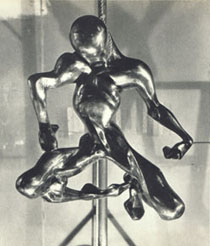| Some Thoughts On our Propensity for Forgetting

It was my intention in this group of works, focused on one of several intermittment
political episodes in Noguchi's career, to create one work that would
capture what is needed to be known about the strange paradoxes of lynching in a very
precise and simple way. Obviously, the "The Meadowlark" is not that work.
But it has, in the course of researching and thinking about the matter
become evident that, from about the third or forth grade onward, every k-12 social
studies/history textbook in America needs to make a substantive statement on
this chapter of reflexive atavism in the American spirit; one that continues
to manifest itself in a myriad of ways. Nor was the meanest part of that
spirt simply confined to Southern racist lynchings. It also showed itself, for
example, in the peculiar instances of traditional family values that permited
some humans to be used as mere lessons of enforcement and training for the
young, either by having them attend their first 'lynching experiences' or, by
permitting them to practice early preparatory skills of intolerance they would employ later in their maturity. Preditory games that ironicaly come to roost at Columbine in a strange theatrical inversion where the prey suddenly turn and compel their predators to identify themselves by group affiliation before murdering them. Dehumanization by association.
That part of the American spirit continues to play itself out in the modern reconstitutions of such matters as capital punishment and the strange twisted logics of its defense or in the merry inversion of predation that our new habit of identifying and locating post-release felons in their homes (sexual predators for the moment, and surely other catagories of offense to follow) and then standing back to watch the state-sponsored violence of the neighborhood mature into its inevitible realization of vengence and mob rage.
Such 'vengence-based' behavior also includes initiating and training our children to take part in these rituals of fear and hate (quite aside from any questions of 'safety'). Who are we kidding, if we don't think after those first warnings have worn thin, that our children's natural curiosity won't lead them by the very houses of the ogre's we told them to avoid? A few taunts, a rock or two through a window.... What child would not test their curiosity and growing prowess by such steps? In those and a dozen other ways, we
continue to plant the seeds of "strange fruit" through a process of demonization, subhumanization and final dehumanization of many kinds of human beings, some guilty of serious offense, some of no offense at all.
It is not the alleged crime or its racial character, or merely passionate difference that
is called into question here. It is the habit of stripping the subject of
their entitlement to due process and of terminally gutting them of the human
relation altogether until they finally attain the immateriality of a dried
husk. While our sentiments may actually delight in this form of retribution, in the end there is little to difference it from the passion of the offenders themselves.
The social studies and civics textbooks in my early schooling ( in the 60's)
devoted perhaps a sentence or two to the matter of lynching, usually after a
chapter, or perhaps several chapters, on the glorious battles and events of
the Civil war. Only in the euphanisms of "reconstruction" and "ante-bellum"
did we get bare mention that, "well yes, sadly, lynchings happened in the
south". I can only imagine that the textbooks of today generally have
dispensed with the matter altogether. Without a clear and developed
statement on this tragic part of America's history in shadow, there is
simply no way to avoid inviting into our lives those same forces that made
lynching a justifiable pasttime with lamentable, if practical, benefits.
The human husk will simply remain one more variety of curiosity for children to poke and
probe until they, too, discover how to ritualize the matter and turn it to their advantage. The practice of modern prosecutorial hyperbole -- "This is the worst case of '____' I have ever seen" -- and third-party 'victim' testamony that introduces rehearsed performance of suffering into judicial proceeding are but echoes of the desire to replace judgment with passion and to dehumanize elements (humans) we would prefer to make invisible in the deliberative process.
I can only urge educators of the future, and the makers of textbooks, to make certain our children know early and umistakeably the ugliness of the social and psychological pathologies which have permitted the perpetrators of lynching and other forms of lawless violence to rationalize their behaviors in the past. There should be no question in young minds that a mob with a rope, or a law that abets such theatrical performance, is never doing society's business; it is merely seeking applause.
December 30, 1999
Red Slider
|
 Back to The Meadowlark
Back to The Meadowlark
 To Death-Space Lobby
To Death-Space Lobby
 To Noguchi Lobby
To Noguchi Lobby